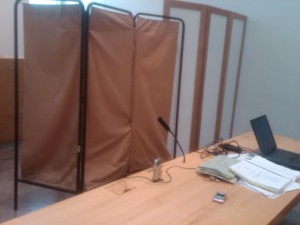Witness in Corrie trial testifies behind a screen.
Haifa, Israel - The Haifa District Court on Thursday granted a government request to allow soldiers to testify behind a screen in the lawsuit filed by Rachel Corrie's family against the State of Israel for her unlawful killing in Rafah, Gaza.
Rachel Corrie, an American human
rights defender from Olympia, Washington, was crushed to death on March 16, 2003, by a Caterpillar D9R bulldozer while nonviolently protesting the demolition of Palestinian homes.
In asking for the highly unusual
protective measures, state attorneys argued that they were necessary to protect the soldiers' safety and prevent their images from being circulated. They based the request on an overbroad security certificate issued by Defense Minister Ehud
Barak in 2008, but did not provide concrete evidence to substantiate their concerns for the soldiers' safety or security.
Corrie attorneys opposed the motion, arguing that allowing the soldiers to testify behind a screen infringes upon the right to an open, fair and transparent trial. They asked to dismiss the request, filed just 48 hours before the first soldier's testimony. Alternatively, the
lawyers asked the court to allow the family to see the witnesses even if the public could not, but their request was denied. Lawyers for the Corrie family plan to appeal the decision to the Supreme Court of Israel.
"While Rachel stood in front of a wall to protect the two families huddled behind it, the state is now making the
soldiers hide behind a wall that denies us the opportunity to see them," said Cindy Corrie, Rachel's mother. "The State of Israel has been hiding for over seven years. Where is the justice?"
The first soldier to testify under the extraordinary new measures was the commander of the second bulldozer. Known to the court only as A.S., with voice muffled behind the screen, he told the court he did not see the other bulldozer strike Rachel and did not remember much about that day.
Contrary to the detailed affidavit he signed less than eight weeks ago, A.S. said he did not know how Rachel had been hurt; did not know the distance from which the bulldozer had approached Rachel;
and did not know the height and width of the mound of earth the bulldozer was pushing.
Also
testifying on Thursday was the head of the Military Police Special Investigative Unit, Shalom Michaeli, who oversaw the investigation into Rachel's killing. He told the court that he stood by his 2003 investigation and saw no reason that
anyone should have been prosecuted.
Michaeli was also in charge of the investigation into the killing of Iman al Hams, a 13-year-old Gaza school girl who was shot and killed by an Israeli soldier in Rafah as she lay injured on the ground in October 2004. A military police internal investigation subsequently
found major failures in Michaeli's investigation, saying it was conducted
unprofessionally and with negligence. The solider who killed al Hams was
court-martialed but subsequently acquitted - in part because of this flawed investigation.
Michaeli's cross-examination revealed similar flaws in the Corrie investigation. These flaws support the family's claim of government negligence, for allowing soldiers and their commanders to act recklessly using armored military bulldozers without due regard for the
presence of civilians.
- Michaeli said that he ordered only a partial transcript of radio transmissions because he did not think it important to transcribe the full audio.
- He said he did not go to the site of Rachel's killing because it was dangerous, the terrain had already been altered, and the vehicles removed by the Israeli military. He acknowledged that he could have gone to the scene in an armored vehicle, but chose not to.
- Michaeli testified in his written affidavit that when he inspected the bulldozer he did not find any signs of blood or other evidence that the vehicle had injured anyone. However, in court testimony he said the bulldozer could have been washed "or even painted" before he inspected it.
- Michaeli said he knew, prior to opening the investigation, there was a video camera recording the area around the clock. But he failed to obtain the tape until March 23, a week after the incident, because it had been previously taken by senior commanders. When questioned about his failure to interrogate the camera operator, who panned away from the scene only minutes before Rachel was killed, he said he did not think it was relevant.
- When asked whether he questioned the bulldozer crews about an Israeli military manual for low intensity conflict that states bulldozers should not be operated near people, Michaeli said the manuals were not relevant. He added that bulldozer operators could not be expected to follow such procedures in this zone. He went on to say that he believed the Israeli army was "at war" with everyone in the area, including the ISM peace activists.
"Today I was struck by the lead investigator's failures - his failure to look for evidence, to secure evidence, to resolve conflicting evidence, and to turn evidence over to this court," said Craig Corrie, Rachel's father. "This is not what we and the U.S. government were promised by the government of Israel when Rachel was killed and it is not what we will accept now."
The proceedings on Thursday were attended by representatives of the US Embassy, who have closely followed the hearings throughout the trial.
Subsequent hearings are scheduled for October 17,18 and 21 between the hours of 9:00-16:00 before Judge Oded Gershon at the Haifa, District Court, 12 Palyam St., Haifa, Israel.
See any changes to the schedule and register to receive further press releases at rachelcorriefoundation.org.
For press related inquiries and further information, please contact:
Stacy Sullivan
stacy@rachelcorriefoundation.org
Phone (Israel): 972-52-952-2143





